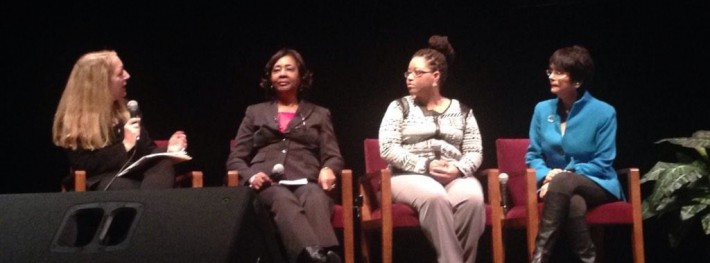CEHD Reads: Henrietta Lacks’ Legacy Panel

How can one person make a difference? That’s the question first-year CEHD students and the college community considered while reading The Immortal Life of Henrietta Lacks by Rebecca Skoot, this year’s CEHD Reads Common Book.
Every year the First Year Experience Program in the Department of Postsecondary Teaching and Learning partners with CEHD Reads to enhance the FYE Common Book assignment with an on-campus event that transforms the personal experience of reading into a collaborative and rich conversation.
In light of the medical and ethical questions raised in this year’s book, Kris Cory, director of the First Year Experience, invited the University’s Center for Bioethics to co-sponsor this year’s Henrietta Lacks’ Legacy Panel.
Filling Northrop Auditorium on a frigid November morning, all first-year CEHD students, along with members of the college community and the general public gathered to hear
Dr. Ruth Faden, director of the Johns Hopkins Berman Institute of Bioethics, lead a thoughtful exploration of how ethical and privacy issues intersect with questions of social justice, sparked by the events chronicled in The Immortal Life of Henrietta Lacks.
As a cancer patient being treated at John Hopkins, Henrietta Lacks, an impoverished, 31-year-old, African-American, had cells extracted and used in research without her consent. Her cells demonstrated the unique ability to be kept alive and grow in a laboratory, resulting in the first human immortal cell line for medical research, identified globally as the HeLa cell line.
Providing details of the Lacks’ family past and present, Victoria Baptiste, Henrietta Lacks’ great-granddaughter, and Shirley Lacks, Henrietta Lacks’ daughter-in-law, shared stories of Henrietta as a generous woman who packed lunches for her husband’s co-workers at Bethlehem Steel. They referenced her firm approach to parenting and described her impeccable style that included red painted toes and well-ironed dresses. They also spoke of the family’s inability to afford health insurance in earlier days, despite the HeLa cell’s contribution to significant medical advances including the polio vaccine.
For decades, the family was kept from knowing the medical importance of the HeLa cell line. In the 1970s, researchers requested blood samples from family members without explanation or follow-up, leaving family members questioning their health and the purpose of the request. In the 1980s family medical records were published without consent, and in 2013, the genome of a strain of HeLa cells was published without permission from the Lacks family. Numerous accounts reveal that the medical community ignored the family’s right to be informed and communicated with and demonstrated disregard for the family’s medical privacy. Despite this negligence, members of the Lacks family moved beyond the disrespect to reach a place of poise and equanimity, reflected in Baptiste’s and Lacks’ presentation and interactions in the discussion.
It is undeniable that Henrietta Lacks, through the HeLa cells, made a difference to millions of people around the world. But, would things be different if permission had been sought? During the panel discussion, moderated by Susan M. Wolf, J.D., McKnight Presidential Professor of Law, Medicine, and Public Policy, Baptiste and Lacks were questioned: “If doctors had asked Henrietta for consent, would she have said yes?”
“Yes, I believe she would have,” said Baptiste. “What better way to provide for and help others.” Lacks agreed, “She was always willing to help.”

